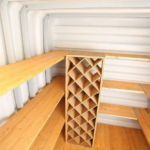The crisis brings its own negative adjustments to the functioning of the construction industry. Thus, non-metallic building materials (sand and gravel) that were in demand before significantly reduced the scale of consumption, which immediately affected their cost – over the past “crisis” year, it fell by almost a third. However, it is premature to talk about a sharp drop in demand for crushed stone and sand – the country is actively building and repair roads, bridges and other non -residential construction objects.
As a rule, infrastructure facilities are built and repaired with money from the state budget, the distribution of which is managed by local municipal authorities. According to some experts, the financing of these construction projects is carried out almost in the same volume, so the demand for stone-sand mixtures, although it has fallen in general, is kept at a stable level.
Usually manufacturers of non-metallic building materials work for a certain region. This makes sense – the transport component significantly increases the cost of the product. Thus, when transported by rail to the neighboring region, the price of crushed stone and gravel increases by a third, and for sand – by as much as 90%.
For the needs of the North-West region of Russia, the production of crushed stone and similar products is concentrated at several plants developing quarries in the Leningrad region and Karelia. The largest manufacturers of non-metallic materials of the Karelian region are still OJSC Granit-Kuznchny and CJSC Kamennorsky Combine of Non-Medical Materials. Other notable manufacturers in this market are LLC Vozrozhdenie and SZNK.
According to statistics, for the incomplete year 2009, the total indicators in terms of the volume of stone and sand products shipped to the consumer from the Karelian quarries have almost halved. Manufacturers are partially rescued by the fact already noted above – there is still demand for products from road construction, non-metallic materials trading companies, as well as a large consumer – Russian Railways.
At the moment, the market price for a cubic meter of domestic crushed stone with a fraction of 5-20 mm is, taking into account transport costs, 1 thousand rubles. And here the main problem of domestic producers is the inability to compete on price with crushed stone imported from Ukraine. After a recent decline in railway tariffs in Ukraine, the cost of crushed stone imported from there, taking into account all taxes and transport costs, is only 800 rubles per cubic meter!
Domestic producers are seriously excited – it is almost impossible to compete with imported Ukrainian crushed stone. After all, a significant component of the price of this construction product is railway and energy tariffs, which in our country not only do not decrease, but, on the contrary, are constantly growing. And no one doubts that the growth of tariffs will continue in the future.
Concern about the current state of affairs in the production of quarry building materials is also shared by the Minister of Natural Resources of Karelia M. Orlov. In his opinion, the decline in shipments of crushed stone and the competitiveness of domestic products largely depend on the services and tariffs of the transport and energy infrastructure. M. Orlov noted that, according to the results of the analysis, an increase in electricity tariffs and railway transportation negatively affects the situation in the mining complex.
Several domestic manufacturers of crushed stone have already applied to President D. Medvedev and Prime Minister V. Putin with a request to limit non-metallic materials imported from Ukraine. Russian mining enterprises propose such measures – to introduce duties on imported products in the amount of 25-30%. In their opinion, such a measure will serve as legal protection for domestic producers of sand and gravel.







